Online Class: American Heroes and Villains

no certificate
with CEU Certificate*
-
14Lessons
-
29Exams &
Assignments -
852Students
have taken this course -
8Hours
average time -
0.8CEUs
Course Description
America's Pantheon of Heroes and Villains
Every epoch has its marquee names that transcend the annals of history—individuals whose deeds, for better or worse, shape the contours of their nation's saga. The United States, with its rich tapestry of narratives, is no exception. From paragons of virtue to those who danced with their darker selves, the U.S. landscape is peppered with figures who have punctuated its story, leaving indelible marks. But what alchemy of fate, choices, and national zeitgeist elevates someone into the realm of household recognition?
Dive deep into "American Heroes and Villains" to embark on an illuminating journey, one that delves into the intricate interplay of personal choices and societal context. What distinguishes George Washington's statesmanship from Charles Manson's notoriety? How do individuals like Jesse James, a legendary outlaw, and Linus Pauling, a groundbreaking scientist, find themselves immortalized in America's collective psyche?
Our course is not merely a parade of biographies. Instead, it's an exploration, an excavation of the underlying currents that cast certain individuals into the spotlight. Beyond a mere recounting of their lives, we unravel the complex tapestry of historical, societal, and personal factors that enshrined them in the pantheon of American icons.
Through meticulously crafted modules, you will:
- Delve into captivating biographical overviews of America's luminaries and those who courted controversy.
- Engage in rich analyses, discerning what renders these individuals iconic in the vast tableau of American history.
- Understand the multifaceted criteria underpinning the rise (or fall) of these personas in the nation's consciousness.
As we navigate the nuanced terrains of heroism and infamy, this exciting course promises to be more than just a history lesson. It's an invitation to a deeper understanding of the American ethos and the myriad personalities that have sculpted it.
Join us, as we unveil the tales of those who've touched the very soul of America, weaving its narrative of greatness, grit, light, and shadow.
Course Motivation
Parameters for the Course
There are entire fields of study that deal with the psychology of what makes people rise above accepted levels of normalcy to attain fame as either a very good person or a social pariah. This is not that course. Rather, here we will attempt to briefly examine some of the factors that might be involved in shaping who these people were and how they came to be well known to the general public.
Since a comprehensive examination of these factors (especially the effects of a person's name, historical surroundings, and psychology) would literally fill volumes and even shelves in a library, it is well beyond the scope of this course to attempt such a feat here. Rather, we will attempt to scratch the surface of these areas and show how they might be relevant to the material presented in later chapters, a departure point for further studies, if you will.
How the Course is Structured
This course will provide a brief biographical sketch of a number of individuals who have become famous in American history as either heroes (those who have won popular favor and have a strong identity with societal and national values) or villains (those who flagrantly broke the law, the public trust, or otherwise alienated themselves from society).
In some rare cases, certain people cannot be easily classified as either, or are classified as both hero and villain depending on whether or not there is a widespread divergence in public opinion regarding the achievements in their life. For example, Aaron Burr may have been a hero to some, but a villain to others based on the events in his life. These ambiguous personalities will be placed in their own separate section at the end of each lesson, where applicable.
Each lesson that follows will be organized by era of American history. For the purposes of this course, we will divide the timeline as follows, Early America, Colonial America, Revolutionary America, The Young Republic, Expansion and Reform Era, Civil War and Reconstruction, The Wild West and the Second Industrial Revolution, World War I, World War II and the Korean war, Post War to the End of the Century, and The New Millennium.
Each entry within each historical era will appear as follows.
Name. The name of the person highlighted.
Role. Hero or Villain (or It Depends).
Area. This is the area of society that this individual pertains to, industry, politics, military, entertainment, and so on. An example of categories used here are Political Leader, Entertainer, Industrialist, Terrorist, and others.
Bio. The main section of each person's entry will contain biographical and historical data related to that person. This section basically tells why he or she is considered a hero or a villain with regards to the United States.
Trivia. On occasion, a tidbit of interesting information will be featured here. There may not be a trivia section for all the people referenced in the course, however.
Quotes. Famous (or infamous) quotes either spoken by the person at hand or about them are provided here. This is to give a more complete sense of who this person is or was, using their own words. Not every person will have a quote from or about them.
What's in a Name?
There is a great deal of debate regarding whether or not a person's name has any effect on their personality. If a person is named Patience, does that mean they will be more patient (or guarantee they will be impatient)? If Adolf Hitler were called Bob Hitler, would that have made any significant impact on his legacy of evil? While there are studies to support the case and those that deny it, the jury is still out on this aspect of human life. However, a few facts seem germane to our study here, namely,
Carpe Diem: A Note about the Times
The times in which a person lives is an important component of shaping how they live their lives and, ultimately, creating who they will become. For example, Alexander Graham Bell could not have invented the telephone without the prior inventions and discoveries that had gone before him. He, of course, could not have invented it after it had already been invented, either, so the window of opportunity for distinguishing himself could only be found in a very narrow historical time period.
The Psychology of Greatness
According to Friedrich Nietzsche, there are certain people in our world who are born for greatness. He called these individuals Übermensch (or "over men"), and claimed that they were imbued with certain qualities that propelled them to greatness above the masses. Whether or not this philosophical position is entirely true still remains a matter for debate. What is not debatable, however, is that some people do seem predisposed to distinguish themselves in one way or another, far more so than their contemporaries. Those who do so in positive ways are considered heroes; those who do so in evil or socially unacceptable ways are forever branded as villains.
- Completely Online
- Self-Paced
- Printable Lessons
- Full HD Video

- 6 Months to Complete
- 24/7 Availability
- Start Anytime
- PC & Mac Compatible
- Android & iOS Friendly
- Accredited CEUs

Course Lessons
Lesson 1. An Introduction to America's Heroes and Villains
 Lesson 1 Video A
Lesson 1 Video A
 Lesson 1 Video B
: Lesson Discussion
Lesson 1 Video B
: Lesson Discussion
 Lesson discussions: Heros and Villains; Reasons for Taking this Course
Lesson discussions: Heros and Villains; Reasons for Taking this Course Complete: Lesson 1 Assignment
Complete: Lesson 1 Assignment Assessment: Lesson 1: An Introduction to America’s Heroes and Villains
Assessment: Lesson 1: An Introduction to America’s Heroes and Villains
Lesson 2. Early America
 Lesson 2 Video A
Lesson 2 Video A
 Lesson 2 Video B
: Lesson Discussion
Lesson 2 Video B
: Lesson Discussion
 Complete: Lesson 2 Assignment
Complete: Lesson 2 Assignment Assessment: Lesson 2: Early America
Assessment: Lesson 2: Early America
Lesson 3. Colonial America
 Lesson 3 Video A
Lesson 3 Video A
 Lesson 3 Video B
: Lesson Discussion
Lesson 3 Video B
: Lesson Discussion
 Complete: Lesson 3 Assignment
Complete: Lesson 3 Assignment Assessment: Lesson 3: Colonial America
Assessment: Lesson 3: Colonial America
Lesson 4. Revolutionary America, Part I
 Lesson 4 Video A
Lesson 4 Video A
 Lesson 4 Video B
: Lesson Discussion
Lesson 4 Video B
: Lesson Discussion
 Complete: Lesson 4 Assignment
Complete: Lesson 4 Assignment Assessment: Lesson 4: Revolutionary America, Part I
Assessment: Lesson 4: Revolutionary America, Part I
Lesson 5. Revolutionary America, Part II
 Lesson 5 Video A
Lesson 5 Video A
 Lesson 5 Video B
: Lesson Discussion
Lesson 5 Video B
: Lesson Discussion
 Complete: Lesson 5 Assignment
Complete: Lesson 5 Assignment Assessment: Lesson 5: Revolutionary America, Part II
Assessment: Lesson 5: Revolutionary America, Part II
Lesson 6. The Young Republic
 Lesson 6 Video A
Lesson 6 Video A
 Lesson 6 Video B
: Lesson Discussion
Lesson 6 Video B
: Lesson Discussion
 Lesson discussions: Historical Era
Lesson discussions: Historical Era Complete: Lesson 6 Assignment
Complete: Lesson 6 Assignment Assessment: Lesson 6: The Young Republic
Assessment: Lesson 6: The Young Republic
Lesson 7. Expansion and Reform Era
 Lesson 7 Video A
Lesson 7 Video A
 Lesson 7 Video B
: Lesson Discussion
Lesson 7 Video B
: Lesson Discussion
 Complete: Lesson 7 Assignment
Complete: Lesson 7 Assignment Assessment: Lesson 7: Expansion and Reform Era
Assessment: Lesson 7: Expansion and Reform Era
Lesson 8. Civil War and Reconstruction
 Lesson 8 Video A
Lesson 8 Video A
 Lesson 8 Video B
: Lesson Discussion
Lesson 8 Video B
: Lesson Discussion
 Complete: Lesson 8 Assignment
Complete: Lesson 8 Assignment Assessment: Lesson 8: Civil War and Reconstruction
Assessment: Lesson 8: Civil War and Reconstruction
Lesson 9. The Wild West and the Second Industrial Revolution
 Lesson 9 Video A
Lesson 9 Video A
 Lesson 9 Video B
: Lesson Discussion
Lesson 9 Video B
: Lesson Discussion
 Complete: Lesson 9 Assignment
Complete: Lesson 9 Assignment Complete Assignment: Henry Ford Racist?
Complete Assignment: Henry Ford Racist? Assessment: Lesson 9: The Wild West and the Second Industrial Revolution
Assessment: Lesson 9: The Wild West and the Second Industrial Revolution
Lesson 10. World War I
 Lesson 10 Video A
Lesson 10 Video A
 Lesson 10 Video B
: Lesson Discussion
Lesson 10 Video B
: Lesson Discussion
 Complete: Lesson 10 Assignment
Complete: Lesson 10 Assignment Assessment: Lesson 10: World War I
Assessment: Lesson 10: World War I
Lesson 11. World War II and Korea
 Lesson 11 Video A
Lesson 11 Video A
 Lesson 11 Video B
: Lesson Discussion
Lesson 11 Video B
: Lesson Discussion
 Complete: Lesson 11 Assignment
Complete: Lesson 11 Assignment Assessment: Lesson 11: World War II and Korea
Assessment: Lesson 11: World War II and Korea
Lesson 12. Post War to the End of the Century, Part I
 Lesson 12 Video A
Lesson 12 Video A
 Lesson 12 Video B
: Lesson Discussion
Lesson 12 Video B
: Lesson Discussion
 Complete: Lesson 12 Assignment
Complete: Lesson 12 Assignment Assessment: Lesson 12: Post War to the End of the Century, Part I
Assessment: Lesson 12: Post War to the End of the Century, Part I
Lesson 13. Post War to the End of the Century, Part II
 Lesson 13 Video A
Lesson 13 Video A
 Lesson 13 Video B
: Lesson Discussion
Lesson 13 Video B
: Lesson Discussion
 Complete: Lesson 13 Assignment
Complete: Lesson 13 Assignment Assessment: Lesson 13: Post War to the End of the Century, Part II
Assessment: Lesson 13: Post War to the End of the Century, Part II
Lesson 14. The New Millennium
 Lesson 14 Video
Lesson 14 Video Lesson discussions: Hero; Villain; Program Evaluation Follow-up Survey (End of Course); Course Comments
Lesson discussions: Hero; Villain; Program Evaluation Follow-up Survey (End of Course); Course Comments Complete: Lesson 14 Assignment
Complete: Lesson 14 Assignment Assessment: Lesson 14: The New Millennium
Assessment: Lesson 14: The New Millennium
Learning Outcomes
- Define what it means to be considered an American hero or villain.
- Summarize American heroes and villains in early America.
- Summarize American heroes and villains in the Expansion and Reform Era.
- Summarize American heroes and villains in the Civil War and Reconstruction.
- Summarize American heroes and villains in The Wild West and the Second Industrial Revolution.
- Summarize American heroes and villains in World War I, World War II and the Korean War
- Summarize American heroes and villains in Post War to the End of the Century
- Post War to the End of the Century, Part II
- Demonstrate mastery of lesson content at levels of 70% or higher.
Additional Course Information

- Document Your Lifelong Learning Achievements
- Earn an Official Certificate Documenting Course Hours and CEUs
- Verify Your Certificate with a Unique Serial Number Online
- View and Share Your Certificate Online or Download/Print as PDF
- Display Your Certificate on Your Resume and Promote Your Achievements Using Social Media

Choose Your Subscription Plan
No Certificate / No CEUs
This course only
| Includes certificate | X |
| Includes CEUs | X |
| Self-paced |

|
| Instructor support |

|
| Time to complete | 6 months |
| No. of courses | 1 course |
Certificate & CEUs
This course only
| Includes certificate |

|
| Includes CEUs |

|
| Self-paced |

|
| Instructor support |

|
| Time to complete | 6 months |
| No. of courses | 1 course |
Certificates & CEUs
Includes all 600+ courses
| Includes certificate |

|
| Includes CEUs |

|
| Self-paced |

|
| Instructor support |

|
| Time to complete | 12 Months |
| No. of courses | 600+ |
Certificates & CEUs
Includes all 600+ courses
| Includes certificate |

|
| Includes CEUs |

|
| Self-paced |

|
| Instructor support |

|
| Time to complete | 24 Months |
| No. of courses | 600+ |
Student Testimonials
- "I loved the instructor videos, giving information and talking about time frames and the topic we were currently learning about." -- Angela C.
- "Excellent instructor." -- Deborah D.
- "The instructor is very knowledgeable." -- Judy R.
- "This was a FANTASTIC course! I learned so much that I didn't even know I was interested in. The best part was being able to pick which hero or villain you could write about. In figuring out which one to write about, I learned a tremendous amount about the other people in the assignments." -- Donna N.
- "Instructor McKenna was well equipped to handle questions I had" -- Randall M.
- "Mac was an excellent instructor, very interactive. I hope to run into him again." -- L T.
Related Courses
-
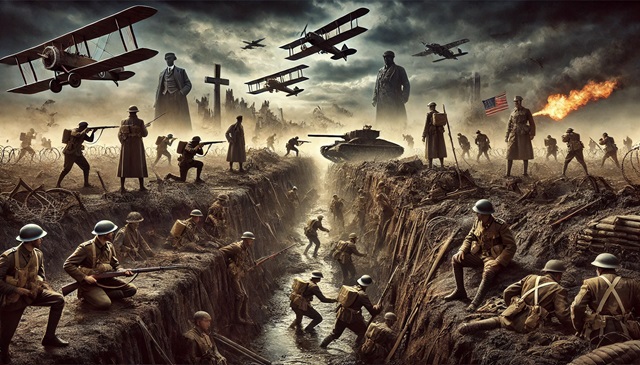 27 hours
2.7 CEUs
World War l and ll
+ More Info
27 hours
2.7 CEUs
World War l and ll
+ More Info
-
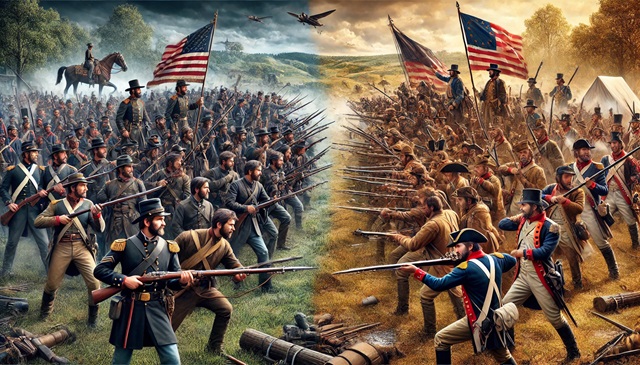 21 hours
2.1 CEUs
American Wars: American Revolution and Civil War
+ More Info
21 hours
2.1 CEUs
American Wars: American Revolution and Civil War
+ More Info
-
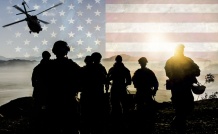 8 hours
0.8 CEUs
American Heroes and Villains
+ More Info
8 hours
0.8 CEUs
American Heroes and Villains
+ More Info
-
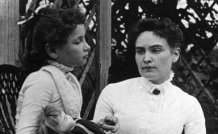 8 hours
0.8 CEUs
Twenty Women Who Changed American History
+ More Info
8 hours
0.8 CEUs
Twenty Women Who Changed American History
+ More Info
-
 12 hours
1.2 CEUs
Philosophy 101
+ More Info
12 hours
1.2 CEUs
Philosophy 101
+ More Info
-
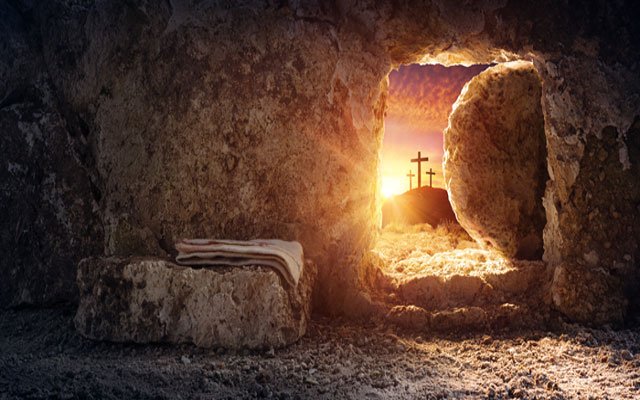 9 hours
0.9 CEUs
World Religions 101
+ More Info
9 hours
0.9 CEUs
World Religions 101
+ More Info
-
 16 hours
1.6 CEUs
The Gulf War
+ More Info
16 hours
1.6 CEUs
The Gulf War
+ More Info
-
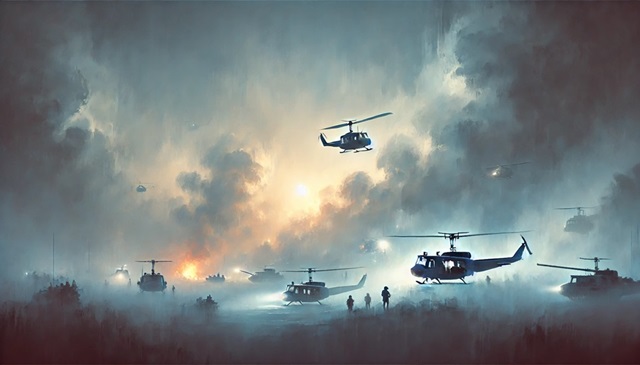 11 hours
1.1 CEUs
Vietnam War
+ More Info
11 hours
1.1 CEUs
Vietnam War
+ More Info









